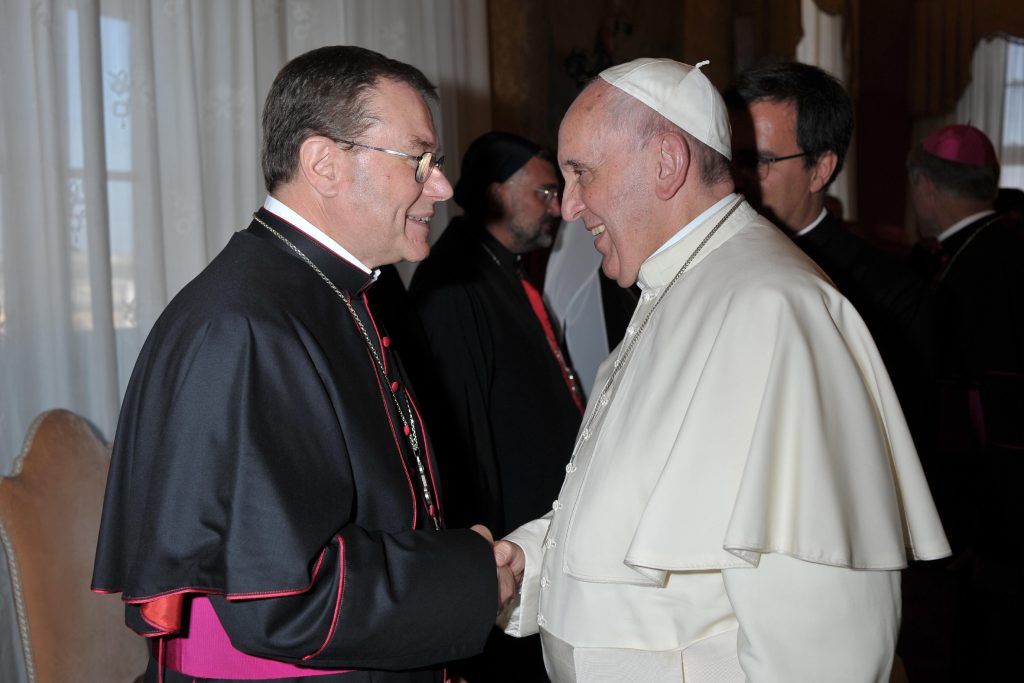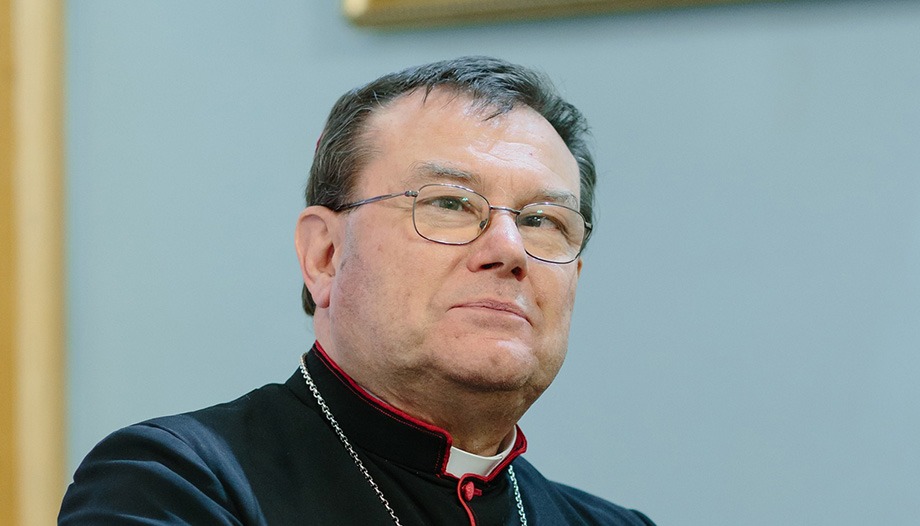Paolo Pezzi is, since 2007, the Metropolitan Archbishop of the Archdiocese of the Mother of God in Moscow. However, the Russian land was already known to this Italian native of Russi, a town located in the province of Ravenna, in Emilia-Romagna.
Ordained a priest in 1990 in the Fraternity of Missionary Priests of St. Charles Borromeo, Bishop Pezzi moved to the newly formed Russian Federation in 1993 as Dean of the Central Region of the Apostolic Administration for Catholics of the Latin Rite in the Asian part of Russia (the present Roman Catholic Diocese of the Transfiguration in Novosibirsk) and editor of the Siberian Catholic Newspaper.
In 2006 he was appointed Rector of the Catholic Higher Theological Seminary "Mary - Queen of Apostles". A year later he became the pastor of the Archdiocese of the Mother of God, which covers a territory of 2,629,000 square kilometers and is home to about 70,000 faithful (out of 58,000,000 inhabitants).
In a painful context, with the war in Ukraine still raging and the faithful in pain, Bishop Paolo Pezzi gave an interview to Omnes in which he assured that "it is important to bring an original proclamation and this is embodied in forgiveness".
What is the current situation of the Catholic Church in Russia?
- The Catholic Church in Russia today is living a special moment of grace, because in the situation in which we find ourselves, she is almost forced to recover the sense of her own presence. In this way, the synodal journey, the liturgy, the works of charity become an opportunity for growth in and for the faith. Moreover, the situation demands an effective missionary witness, real, made with one's own life, with one's own vocation, and not only in words.
What are the challenges and opportunities for Catholics in Russia?
- The greatest opportunity we have is to be ourselves, to live our identity with peace and freedom. Certainly, this is an important and dramatic challenge: it asks us to be sincere in our relationship with Christ.
Secularization is a global problem. Despite its Christian tradition, do we find a secularized Russia today?
- Secularization is, in my opinion, a circumstance that God makes us go through. Therefore, it is not something negative a priori. It can become negative, as in secularism, when it goes against: against tradition, against Christianity in order to destroy it. But in principle it is a typical condition of a given epoch.
Secularization also unmasks that Christian countries are no longer Christian, as Péguy wrote; that, more generally, religiosity or religious beliefs have become detached from life. This is a question already raised by the Second Vatican Council for the years to come, although, in the words of the saintly Pope Paul VI, worldliness has entered the Church, instead of the Church leavening the world. This process has long since reached Russia. It can be accepted or denied, but it remains a fact. The question is how to use this situation for the good, the growth of society, with what proposal to reverse it.
Russia is an eminently Orthodox land, what are the relations with our Orthodox brethren at the "ground" level?
- Relations have cooled a bit, but we always try to keep the door open. It must be said, however, that on a more "earthly" level, exchanges of views and mutual help are on the increase.
What points of unity between Orthodox and Catholics can we foster?
- Theological dialogue is currently more "in the swamps", it is important to keep it open, but now it is objectively more difficult. On the other hand, the debate at the academic level is more accessible. Let us not forget that in the Middle Ages the meeting took place precisely at the academic level and relaunched a movement that today we would say ecumenical.
Are steps towards unity being taken or are there still seemingly insurmountable obstacles?
- I believe that this is not the time to think about steps towards the unity of our Churches. At this moment we have to sit at the table, have a glass of good wine, and then it will be more difficult to hate each other and easier to love each other.
How is the Catholic Church, its priests, religious and faithful viewed in Russia?
- In a way, one finds a bit of everything. Welcoming and a desire to judge together the events of this time; a certain cordiality, but without too many implications; indifference and even a certain detachment.
How does the Church in Russia exercise its missionary calling?
- First of all, we must rediscover that our nature is missionary. The Church exists for mission, to bring Christ to those she encounters. However, it is not even an activity, nor is it a duty. Being missionary is the fabric, the skin of our person. One is a missionary, one does not "do" mission.
Having said this, the Catholic Church has beautiful instruments at her disposal for her missionary witness: the liturgy, which, because of its essentiality, its discretion, is extremely fascinating. Then the Social Doctrine, which is one of the most adequate and modern doctrines in the world. And finally, the Magisterium, which allows the Church to live the present with its needs and challenges, like no other constitutive or dogmatic document in the world!
Since the beginning of the conflict with Ukraine, the Pope's calls for peace have been incessant and seconded by you, how are the Catholics of Russia living this conflict?
- For us the situation is quite complex, dictated by the fact that the positions are very diverse, and we prefer a free approach rather than a "dogmatic" one. That said, my experience is to see fear, uncertainty, even despair.
The faithful ask for consolation, accompaniment, they ask not to be left alone, to be helped to judge what is happening. And this is what we try to do from the confessionals, from the pulpit, in personal conversations.

What is the role of the Catholic Church at this time and in this situation?
- The Bishops' Conference of the Russian Federation intervened with two statements at the beginning of the military operation and on the occasion of the mobilization to arms. For us, it was and is important to bring an original announcement, and this is embodied, in our opinion, in forgiveness, a forgiveness offered without preconditions, like the forgiveness of Jesus on the cross. We are convinced that forgiveness, the purification of historical memory and dialogue are the conditions for a just peace.
What is your assessment of the Holy See's efforts in this conflict?
- Whether we like it or not, the will of the Holy See is the only real and concrete proposal for peace, because the Pope is the only one who today does not have his own interests at heart, but the good of individuals, peoples and countries. We hope that all those involved will see in it a method of action for themselves.









